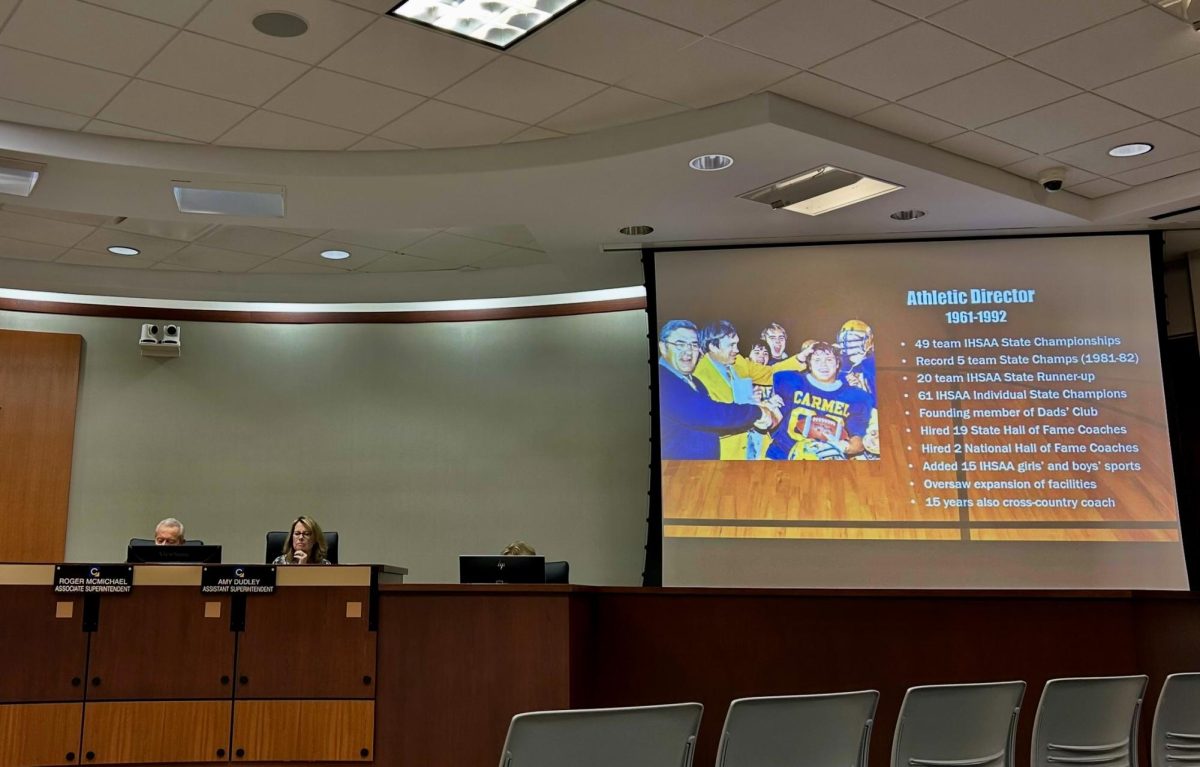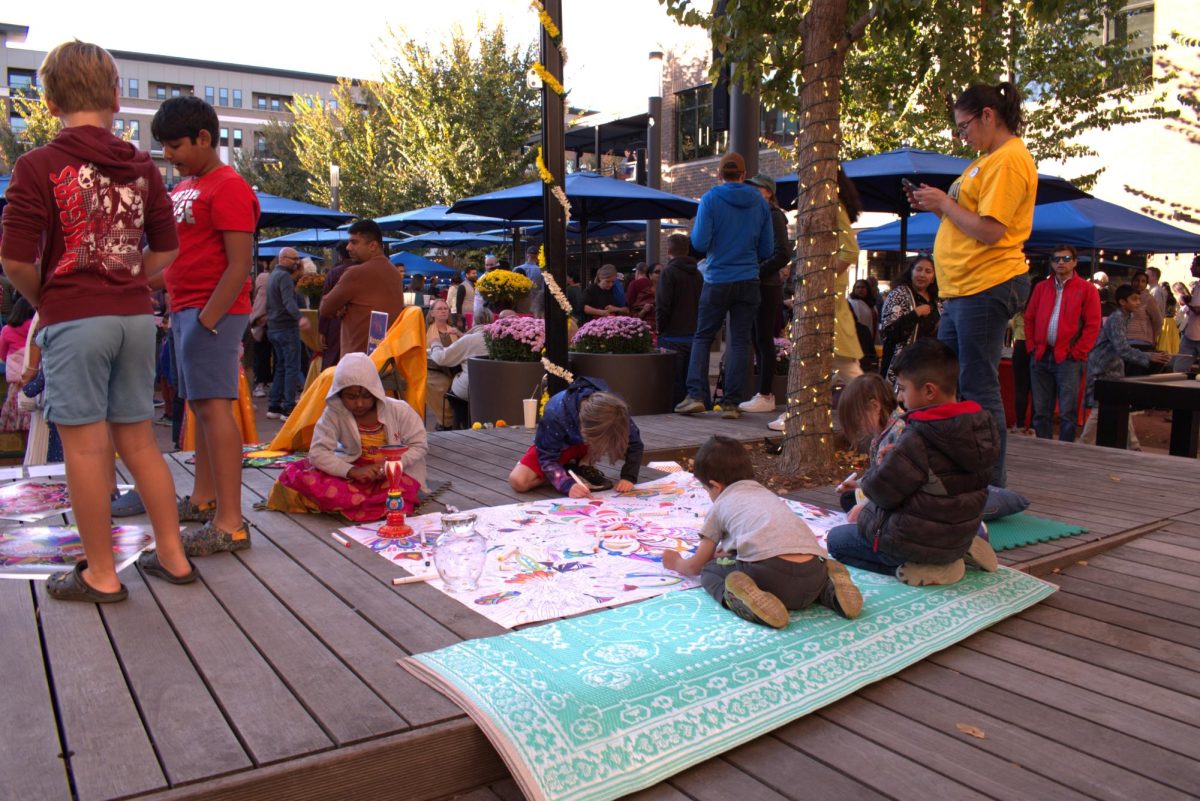Senior Cordell Hobbs claims he still has the scar from his childhood when he attempted to seize a bottle full of milk from his twin brother, senior Cardell Hobbs, who in turn would not relinquish the bottle and ended up hitting the bottle on his brother’s lip. By their account, even when they were merely babies, Cardell and Cordell have been constantly fighting. In almost all aspects of their lives, whether it be football or simply eating food, they said, sibling rivalry has flourished and dominated the relationship between the Hobbs brothers.

Cordell said, “It’s the biggest sibling rivalry out of any siblings I know. It’s always been a rivalry even when we were babies, and it’s always going to be one.”
Cardell and Cordell are not alone. According to Todd Casbon, a psychologist and owner of LifeCare Counseling Services, sibling rivalry is a normal and natural occurrence within the family and stems from the fact that siblings reside together, so conflict is bound to arise. In some cases, Casbon said rivalry between siblings can develop at a relatively young age, but becomes most intense during teenage years because teenagers are in a state of personal and social development.
“Sibling rivalry often sprouts and evolves from siblings participating in similar activities,” Casbon said. “The competition from these activities is usually academic or athletic.”
Cordell said he and Cardell participate in most of the same activities, academic and athletic, and, as a result,
competition arises.
“We compete for better grades and in sports,” Cordell said. “We are in Carmel football now, and if (Cardell) does something wrong, I’ll always be in his face. If he’s the number one guy, and I’m number two, I obviously would want to take his spot.”
According to Casbon, the difference between ages in a sibling relationship can play a role in such competition. Casbon said he has seen sibling rivalry between siblings that are relatively close in age and in relationships where there is a significant age gap.
He said, “Often times, younger siblings strive to live up to an older sibling, whereas older siblings often feel that because they are older have an advantage and fear when the younger one is trying to gain on them like in athletics or in height.”
Cardell said his brother and he always compete for weight size and height. Although Cardell and Cordell are twins,
Cordell Hobbs is still older than Cardell, and this fact supports the Hobbs twins similarity to the rivalries between siblings with a larger age gap.
“Cordell always pushes that fact that he was born three minutes earlier, which isn’t a lot,” Cardell said. “Cordell wants to be the dominant one and says he know what I’m doing. He often tells me that I am a rookie, so I don’t know what I am doing.”
Junior Sunhee Han said she also feels that age difference augments a sibling rivalry. Han said, “I feel overshadowed by my sister, who is four years older and goes to MIT, a prestigious college. Usually parents expect the younger one to hold up the expectations of the older one.”
According to Casbon, parents play an important role in sibling rivalry in how they handle the situation. Parents need to monitor interactions between both kids to make sure they are not becoming abusive, and if they are engaging in such behavior, the parents discipline their children. Parents also need to value each and every one of their kids and their strengths.
Casbon said, “It is important to not play favoritism and conditions of worth like if one sibling is better than the other in a certain aspect.”
Han said her parents also play a role in her sibling rivalry. She said her parents do not show favoritism, but when she was younger her parents often compared her to her older sister. But now, she said, they understand and acknowledge they are different in a lot of aspects and thus expect different things from us.
Han said, “(My parents) are aware that my sister is good at math and science, and I am better at English. They don’t expect me to go from a good school like MIT, but they still have high expectations.”
Han’s mother Jongsun Lin said she agrees in how she used to compare both of her children, but she said she stopped since her husband said it was not right to compare them since
they are different.
“I realized comparing is not helpful or healthy,” Lin said. “I don’t show favoritism, and I don’t want to force the expectation on Sunhee to go to a school like MIT because that is not fair. Now, I accept their individualities and encourage them both.”
Like Han’s mother, Kimberly Hobbs, Cardell and Cordell’s mother, said she shows no favoritism and plays a role in her children’s sibling rivalry.
“I listen to both of them,” she said. “And when their fights become too serious, I try to intervene.”
Cordell said he supports his mother’s claim in her acting as a moderator in trying to appease the sibling rivalry. “Our mom always gets mad when we are arguing or competing,” he said. “So, when we are arguing, my mom will come and
break us up.”
Sibling rivalry can be negative when it is abusive or causes sibling to distance themselves, Casbon said. Negative effects can stem out of negative interactions where one or both siblings are physically or verbally abusive to another or damage is done to one’s self- esteem. Casbon said, “Rivalry can cause the siblings to drift apart by constant competing, and this can overtime harbor severe hostility that damages the bond between siblings.”
Cardell said such negative aspects arise from his sibling rivalry. He said he constantly gets into fights with Cordell that are both physical and verbal, and this constant bickering leads to agitation from his parents and coaches. Cardell said, “The other day I was doing something disrespectful while Coach was talking, and Cordell was like ‘Stop.’ Coach was like ‘Cordell, stop it; I got this’.”
Han said she also agrees that sibling rivalry has several disadvantages. Han said she always gets compared to her sister by peers and is known as “Jane Han’s sister,” not as an individual. In addition, she said one of the siblings always feels inferior in a sibling relationship because one sibling always achieves higher than the other. Han said, “I feel like I have to be equally as good as her, but I also feel motivated to do as well as my sister. She isn’t just smart but works hard as well, and this causes me to work harder.”
Still despite the conflicts, sibling rivalry can produce some positive effects, such as motivating siblings to perform better, according to Casbon. In athletic competitions, he said siblings will often push themselves harder to perform better than or as well as their other sibling.
Casbon said, “Sibling rivalry can help people to develop their skills better, concentrate on their work, and
ultimately improve.”
Cordell and Cardell both said they agree that their sibling rivalry has pushed them to perform better. Cardell said when he competes against his friends in some activities, there is no competition, and his biggest rivalry is with his brother because he is hard to compete with.




























![Keep the New Gloves: Fighter Safety Is Non-Negotiable [opinion]](https://hilite.org/wp-content/uploads/2024/12/ufcglovescolumncover-1200x471.png)






!["Wicked" poster controversy sparks a debate about the importance of accuracy versus artistic freedom [opinion]](https://hilite.org/wp-content/uploads/2024/11/riva-perspective-cover-1200x471.jpg)









































![Review: “We Live in Time” leaves you wanting more [MUSE]](https://hilite.org/wp-content/uploads/2024/12/IMG_6358.jpg)
![Review: The premise of "Culinary Class Wars" is refreshingly unique and deserving of more attention [MUSE]](https://hilite.org/wp-content/uploads/2024/12/MUSE-class-wars-cover-2.png)
![Introducing: "The Muses Who Stole Christmas," a collection of reviews for you to follow through winter [MUSE]](https://hilite.org/wp-content/uploads/2024/12/winter-muse-4.gif)
![Review: "Meet Me Next Christmas" is a cheesy and predictable watch, but it was worth every minute [MUSE]](https://hilite.org/wp-content/uploads/2024/11/AAAAQVfRG2gwEuLhXTGm3856HuX2MTNs31Ok7fGgIVCoZbyeugVs1F4DZs-DgP0XadTDrnXHlbQo4DerjRXand9H1JKPM06cENmLl2RsINud2DMqIHzpXFS2n4zOkL3dr5m5i0nIVb3Cu3ataT_W2zGeDAJNd_E-1200x884.jpg)
![Review: "Gilmore Girls", the perfect fall show [MUSE]](https://hilite.org/wp-content/uploads/2024/11/gilmore-girls.png)
![Review in Print: Maripaz Villar brings a delightfully unique style to the world of WEBTOON [MUSE]](https://hilite.org/wp-content/uploads/2023/12/maripazcover-1200x960.jpg)
![Review: “The Sword of Kaigen” is a masterpiece [MUSE]](https://hilite.org/wp-content/uploads/2023/11/Screenshot-2023-11-26-201051.png)
![Review: Gateron Oil Kings, great linear switches, okay price [MUSE]](https://hilite.org/wp-content/uploads/2023/11/Screenshot-2023-11-26-200553.png)
![Review: “A Haunting in Venice” is a significant improvement from other Agatha Christie adaptations [MUSE]](https://hilite.org/wp-content/uploads/2023/11/e7ee2938a6d422669771bce6d8088521.jpg)
![Review: A Thanksgiving story from elementary school, still just as interesting [MUSE]](https://hilite.org/wp-content/uploads/2023/11/Screenshot-2023-11-26-195514-987x1200.png)
![Review: "When I Fly Towards You", cute, uplifting youth drama [MUSE]](https://hilite.org/wp-content/uploads/2023/09/When-I-Fly-Towards-You-Chinese-drama.png)
![Postcards from Muse: Hawaii Travel Diary [MUSE]](https://hilite.org/wp-content/uploads/2023/09/My-project-1-1200x1200.jpg)
![Review: "Ladybug & Cat Noir: The Movie," departure from original show [MUSE]](https://hilite.org/wp-content/uploads/2023/09/Ladybug__Cat_Noir_-_The_Movie_poster.jpg)
![Review in Print: "Hidden Love" is the cute, uplifting drama everyone needs [MUSE]](https://hilite.org/wp-content/uploads/2023/09/hiddenlovecover-e1693597208225-1030x1200.png)
![Review in Print: "Heartstopper" is the heartwarming queer romance we all need [MUSE]](https://hilite.org/wp-content/uploads/2023/08/museheartstoppercover-1200x654.png)



